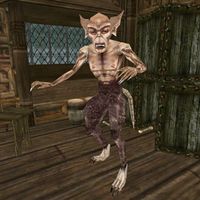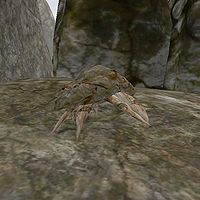Morrowind:Commerce
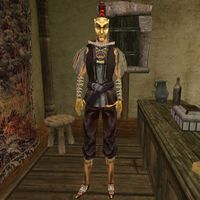
Commerce is the exchange of coin for goods or services, and is the most common way to make money in Morrowind.
Generally, prices are affected by two factors:
- Your Disposition with the merchant, which can be raised by persuasion as well as by Reputation; this includes general Reputation as well as Faction Reputation, if you are a member of the same faction as the merchant / service provider.
- Your Mercantile skill, which can be raised by training, trading items, or bribing NPCs.
Both of these factors affect all types of commerce, even those that do not involve trading items, for example: buying spells, enchanting items, spellmaking, repairing items, receiving training, and transport.
Contents
Items and Merchants[edit]
Items can be bought from or sold to merchants.
Very few merchants trade in all types of items; some specialize in specific wares. For example, clothiers trade exclusively in clothing items; they will neither buy nor sell armor or weapons. Generally, you can barter the most number of item types with pawnbrokers and traders.
Additionally, very few merchants will be willing to barter with you if you're carrying contraband items or if you are a vampire.
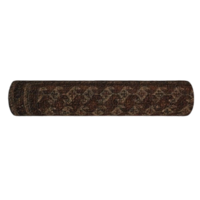
Base Value[edit]
If you hover over an item in your inventory, you will see its base value, which is how much the item is worth. Almost all vendors raise their selling price and lower their buying price depending on how much they like you. Thus, they will rarely offer to buy or sell items at base value.
Additionally, if the item is an armor or a weapon, the buying price will be reduced further if the item is damaged. To get the best price, make sure your items are fully repaired before you sell them. It's always cheaper to repair them yourself, rather than paying a smith for the service.
You may, however, bargain with the merchants by offering a different price. If they accept your offer, you'll receive experience in your Mercantile skills. On the other hand, if the find your offer unreasonable, you may lose disposition with them. Having a higher Mercantile skill allows you to haggle more aggressively.
Merchants' Gold[edit]
Most merchants have a fixed amount of gold with which to purchase items. This increases when you buy items from them (or avail of their services if they are also a service provider) and decreases when you sell them your stuff. Regardless, this amount resets to its original value every 24 hours.
If you try to sell a merchant something worth more than the gold they have, they can offer you only up to that amount. Should you accept that offer, they will not be able to afford anything else from you unless you buy something from them or their gold resets to its default amount the next day.
Increasing Merchants' Gold[edit]
Loot is plentiful in Morrowind and you can easily collect more than a merchant can afford. There are also items whose base values exceed the available gold of most vendors. In order to maximize your profits, you may try searching elsewhere for a wealthier merchant. However, it is more convenient to simply make merchants richer, albeit temporarily. There are two ways you can do this:
- Buy something from them. This increases their available gold so they can better afford what you're selling. If you won't be using the items you have bought, you can either sell them to other merchants, or sell them back to the same merchant the next day.
- Merchants keep items you have sold them in the past, so if you have already sold them expensive items before, you can buy those so they can afford to buy much more expensive items from you.
- You can also avail of their services if the merchant is also a service provider like an enchanter, a spellmaker or a trainer. Custom-made enchantments and spells tend to have high prices, so right after purchasing one, you can sell your expensive items back to the merchant to recoup the cost of the service. The tricky part is finding merchants who are also service providers.
- The merchant's available gold may not increase if you have not yet attempted (but not necessarily concluded) trading with them. Before availing of their services, try to barter with them first. You don't need to buy or sell anything, just open the barter window. Doing so will ensure that your payment for enchanting, spellmaking or training is added to their available gold.
- Training advances time by two hours. If you train too many levels, the merchant's gold may reset and you can no longer recover the money you spent on training.
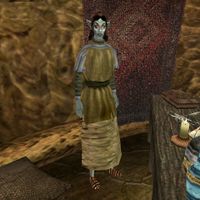
Increasing Merchants' Stock[edit]
A lot of vendors "restock" certain items, which means that they will always have a certain (often small) amount of those for sale. Regardless of how many times you buy those items from them, their stock will never deplete.
If you need a lot of these items (e.g. ingredients from alchemy vendors, soul gems from Fadase Selvayn, etc.), you might find it tedious to buy a small amount multiple times and would like the vendor to restock more of the items you need. To solve this problem, simply sell the items you need to the vendor.
For example, Arrille always keeps a stock of 100 chitin arrows. If you have, say, 50 chitin arrows with you (even ones bought from him), just sell them to him and that will increase his stock to 150. From then on, you'll be able to buy chitin arrows from him in batches of 150. If that is still not enough, keep buying chitin arrows and selling them back to him until his stock reaches a satisfactory amount.
Creature Merchants[edit]
Unlike NPCs, creature merchants are unaffected by Disposition or Mercantile skill levels. Thus, they always buy and sell items for their base value. There are two that stand out for not being hostile as well as having more gold than most of the other merchants, creature or otherwise.
Creeper[edit]
A scamp merchant inside Ghorak Manor in Caldera. He has 5000 gold available for trade. He can buy armor, enchanted items, potions, weapons and miscellaneous items.
Mudcrab (merchant)[edit]
A mudcrab merchant on a small island east of the Dwemer ruin of Mzahnch. He has 10000 gold available for trade, more than any other merchant in the base game. He is a little bit more selective than Creeper, though; he does not buy miscellaneous items. However, he still trades in armor and weapons, which tend to be the most expensive items anyway.
If you are looking for him, be aware that he looks exactly like any other mudcrab and is named "Mudcrab", as well. To see if you've got the correct mudcrab, either wait to see if it attacks or simply try talking to it.
Services and Service Providers[edit]
The prices offered by service providers are non-negotiable. You can only accept or decline their offer; you cannot haggle by countering with an offer of your own. Nonetheless, better Disposition and a higher Mercantile skill level still helps you avail of services at better prices.
There are some exceptions that are unaffected by these factors such as the cost of a bed at taverns or the donation needed to receive blessings at shrines. However, these generally have a very negligible cost. Another exception is removing the price on your head through the Thieves Guild, where the cost of the service depends solely on your bounty.
For trainers, aside from the Mercantile skill, the cost of their service also depends on the level of the skill being trained; it is cheaper to train a low-level skill than the same skill at a higher level.
